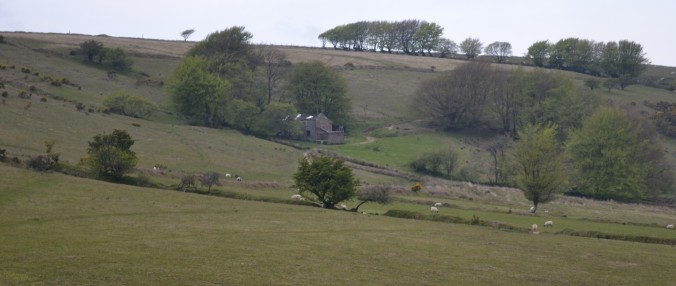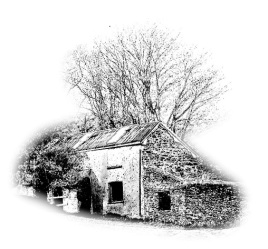“The centuries have come and gone and so have the many shepherd families that used to call me home. All around me the moorland hills, now quiet and deserted, were once abuzz with the men, women and children living in this isolated spot. Once I was the centre of their lives. Now I am a ruin. But my old stone walls still echo with their voices. I am a home with a story to tell. ”
I am #hoaroaktalking

Not far from me – about half a mile away and down by the river – is a patch of ground that is a bit drier than most of the moorland all around me. I can see it easily from my top windows. You can see it from the top of the ridge opposite. Everyone can see it from my front door. It is always a slightly different colour. The plants are different you see because the soil they are growing in is unusually dry. There are no weeping, seeping springs in that patch. There are no rivulets carrying water, collected from higher up the moor, down to the river. And when dawn breaks over the hills in the distance this is the first place the sun drops its warmth in the morning. This patch is dry and sunny – well a bit drier and a bit sunnier than most of the fields around me – and for as long as I can remember daisies have grown there. Spring comes late up here at Hoar Oak but when the daisy field is in bloom you know summer is on the way and it is a treat for everyone. I love it. My people love it. Everyone calls it the Daisy Field. Always have done. Maybe they always will do. I don’t know. I can only tell about the past. So that will have to do. Let me tell you what I remember about the Daisy Field.
For most of my time I was quite a small place. Just one room and during the summers I was lived in by just one man – the summer shepherd out here on Hoar Oak with his flock grazing on the summer grass. That’s not to say the shepherd was always alone mind you. I know I’m a long way from anywhere but if my summer shepherd had a sweetheart, and that sweetheart had strong legs – which of course most hard working girls did in those days – I’d often see a maiden making her way over the brow from Furzehill and down the track that led to my back door. Maybe it was her day off or, in the long summer nights, maybe it was after she’d finished her day’s work. Maybe she’d have a basket over her arm with some bits and pieces to eat in it. Always she’d have a lightness to her step and almost always the shepherd would be there to meet her as she came down the path towards me.
Now. Don’t get carried away. Don’t go thinking they huddled straight into my walls and got up to nonsense. First of all, no self-respecting girl would want to come inside my walls in those days – I was a dark, damp, smelly place. The central fire pit never quite went out and I was full of the rich odour of a shepherd who’d spent his days on the moor and the nights asleeping, fully clothed, on my dirt floor. No. I was not what you’d call a pretty spot that might win a maiden’s heart. And secondly those were, dear listener, rather more innocent days and romance was slow thing. The two would greet shyly. The shepherd would take the girl’s basket as if relieving her of a precious load. They’d wander down to the driest place to sit by the river – down to the Daisy Field. A lovely spot for a picnic and a chat and a bit of fun. Maybe they’d be daring and kick off their shoes and go barefoot in the cool river water. Maybe they’d be a bit more daring and kick off more than their shoes and sometimes a marriage would come along towards the end of that summer. A Daisy Field marriage the locals would call it.
Later, when I grew a bit bigger, when my one room had become two and a ladder led up to another room built under the eaves for sleeping in, the married shepherds lived in me all year round. They came with their wives and in those days the babies often came along every two years or so. For a woman with a new baby to tend to; baking and chores to do; and three or four other small children rushing about it was a crush inside my walls. Over the years I’ve seen many a housewife desperate to get the kids out of the way for a bit. Somewhere still in earshot. Somewhere that could be seen from my windows. Somewhere away from the boggy ground so the children didn’t ruin their shoes (if they had any) or get their clothes wet (what little they might have of them). The Daisy Field was the obvious choice and they’d be sent off with eldest child in charge.
I still laugh when I think back to seeing a young boy or girl, maybe only ten or eleven years old, in charge of several tiny wee scraps of younger brothers and sisters. They were told, ‘Of you go, down to the Daisy Field to play, and mind you keep an eye on little Edwin, or young Sarah, or Mary or Betsy or ‘our Willum’. And off they’d go. A trail of near-wild creatures running down the path to the Daisy Field to spend hours all alone. All together. In their safe little pack and under my watchful gaze. They’d play and make up games; try to catch fish without getting (too) wet; lie on their backs; watch the clouds and have discussions about their world out here at Hoar Oak. If the Rector had been on a pastoral visit recently out here at Hoar Oak or the children’s father had read to them from the Bible, the childrens’ talk of clouds might turn to God and Jesus as they tried to make their own sense of religion. A lot of learning and debating and decision making went on down in that field.
And it wasn’t just the children who played and talked in the Daisy Field. The shepherd and his wife would also go there. A place to be quiet and alone with each other. Away from my crowded walls. On a warm spring night or a hot summer evening, when the children were asleep and the chores all done, the shepherd might say to wife ‘shall us go down Daisy Field? The children will be fine here without us.’ I liked that they trusted me – a silly old cottage out here on the moor. They trusted me to keep their precious family safe and I’d make sure to do my very best for them. As I squared my shoulders to the task I’d see them wander off down the track. They’d go for a bit of a quiet time, for a bit of a natter, for a bit of a smoke – men and women often shared a clay pipe smoke in those days – and sometimes for a ‘bit of the other’ as so many called their loving time together. As my walls filled with more and more children there was less and less opportunity for a man and wife to be, well, a man and wife, and a warm night at the Daisy Field offered just such an opportunity.
Afterwards, the shepherd, if he were the romantic sort, might make a daisy chain and place it on his wife’s head – a pretty sight. Afterwards, his wife might make and secretly place a daisy chain on her husband’s sleeping head and not bother to tell him ‘til they were back inside my door. She’d giggle and point to his head and say ‘you’d better take that off in case you scare the childer.’ And he might laugh or he might growl but it was all fun. It was all Daisy Field fun. And many times I’ve heard one of my housewives say to her shepherd husband, quietly of a night, when the days were getting shorter and the fire was lit for a bit of evening time comfort “I think there may be a daisy field child on the way” and they both knew what that meant.
The surveyors came to Hoar Oak in 1836. Those poor men wandered about in all conditions, sunshine and rain, with staves and long measuring tapes. They were trying to draw up a map of the land around me. To identify and plot the fields. To calculate how big they were. To find out how much tithe the owner had to pay. I heard them talking to my people and wondered what a tithe was. My only clue was my shepherd murmuring behind their backs to his wife, ‘nice enough chaps they are but them bleedin’ surveyors are here to work out how to charge us taxes.’ Even I knew what taxes were. Over the years I’d heard enough of my people talking about death and taxes. Not good. Well, one day I heard those surveyor chaps inside my walls asking if any of the fields around me had names. ‘Well, yes’ I heard the shepherd say ‘I think some of them may have names’ and I could tell he was trying to be cagey. I knew what he was doing. Holding back on the information the surveyors needed with the hope that maybe the taxes they calculated would be lower. Wouldn’t hurt them not to know about every field around me was his reasoning.
But before he could complete his cunning game of cat and mouse with the surveyors I heard the children shout out ‘Pa, make sure you tell him about the Daisy Field and how we get there – you know, through the House Field, then the Gate Field, past Goviers Lake Field and then down to the Daisy Field.’ This was their world. They were proud of it and even prouder of their precious knowledge of the small world they inhabited – a world where the Gate Field might as well have been France and the Daisy Field as far away as if it was India. They could recite all of the names of the fields around them and they were happy to show this skill off to the surveyors. Their father groaned and glared but it was too late and so it was the Daisy Field was put on the map. Along with all of the other fields around me – the Higher Six Acres, the Bottom Piece, Goviers Lake Field the Oaken Piece and on and on they go. Nearly 20 fields which make up my world out here at Hoar Oak. You can find them if you want to. You can look on the map and find them. It’s all there to see. And you can find them out here on the moor. They’re all still here. You can come and find the Daisy Field, sit in it and think about this story. You can look at the clouds, listen to river bubbling past, ponder on God if you wish, keep nice and dry and – if it’s the right time of year –be surrounded by daisies.

HOAROAKTALKING Copyright © Bette Baldwin 2017
To find out more visit www.hoaroakcottage.org
To learn more about the Tithe Maps of 1836 at Hoar Oak Cottge visit The Daisy Field Blog

